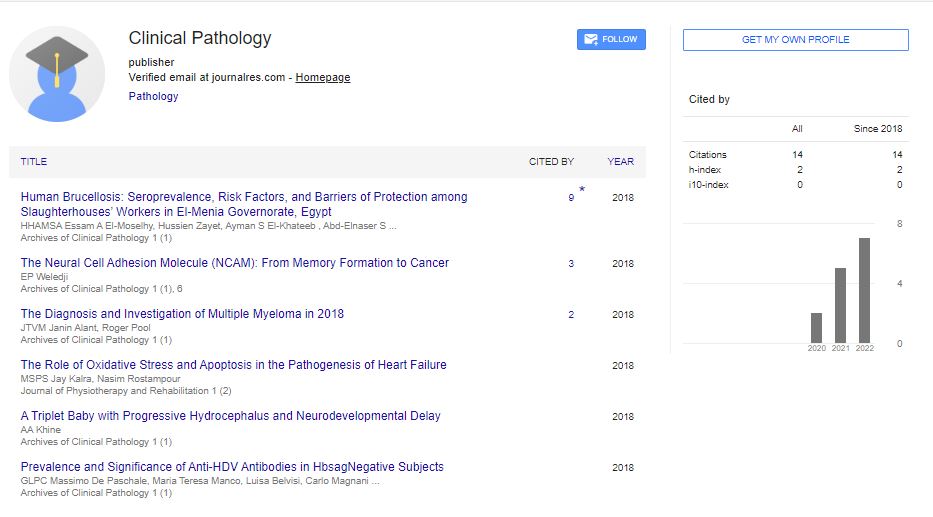Opinion Article, Arch Clin Pathol Vol: 6 Issue: 3
Cytogenetics: Significance and Advancements in Medicine
Pierre Peyro*
1Department of Hematology, Centre Henri Becquerel, Rouen, France
*Corresponding Author: Pierre Peyro,
Department of Hematology, Centre Henri
Becquerel, Rouen, France
E-mail: peyropi7@gmail.com
Received date: 30 August, 2023, Manuscript No. ACPY-23-117811;
Editor assigned date: 01 September, 2023, PreQC No. ACPY-23-117811 (PQ);
Reviewed date: 15 September, 2023, QC No. ACPY-23-117811;
Revised date: 22 September, 2023, Manuscript No. ACPY-23-117811 (R);
Published date: 02 October, 2023, DOI:2324-8955/acpy.05.03.100093
Citation: Peyro P (2023) Cytogenetics: Significance and Advancements in Medicine. Arch Clin Pathol 6:3.
Abstract
Cytogenetics is a fascinating and crucial field of genetics that focuses on the study of chromosomes, their structure, and how abnormalities within them can impact human health. By examining the genetic material within the nucleus of cells, cytogenetics provides profound insights into inherited diseases, cancer development, and many other conditions.
Description
Cytogenetics is a fascinating and crucial field of genetics that focuses on the study of chromosomes, their structure, and how abnormalities within them can impact human health. By examining the genetic material within the nucleus of cells, cytogenetics provides profound insights into inherited diseases, cancer development, and many other conditions. In this article, we will delve into the world of cytogenetics, exploring its significance and its role in advancing our understanding of genetics and medicine.
Cytogenetics is instrumental in diagnosing and understanding genetic disorders such as Down syndrome, Turner syndrome, and Klinefelter syndrome. By identifying chromosomal abnormalities, cytogeneticists help patients and their families better comprehend the genetic basis of these conditions. The study of chromosomal abnormalities in cancer cells, known as cancer cytogenetics, helps oncologists and researchers identify specific genetic changes responsible for tumor development.
Cytogenetics plays a vital role in prenatal diagnostics by assessing the chromosomal health of foetuses. This enables early detection of chromosomal abnormalities and helps prospective parents make informed decisions regarding pregnancy. Cytogenetics can provide insights into the evolution of species by examining the structure and variations of chromosomes. This information helps scientists understand genetic diversity and evolutionary processes. Karyotyping involves staining and visualizing chromosomes under a microscope.
This technique is particularly useful for identifying numerical and structural chromosomal abnormalities. Fluorescence In Situ Hybridization (FISH) uses fluorescently labelled DNA probes to bind to specific regions of chromosomes. It allows for the detection of specific genes or chromosomal changes, making it a valuable tool in cancer diagnostics and prenatal testing. Comparative Genomic Hybridization (CGH) is a high-resolution technique used to identify chromosomal gains and losses, which can be crucial in diagnosing genetic disorders and detecting genomic imbalances in cancer. Chromosome Microarray Analysis (CMA) is a high-throughput technique that allows for comprehensive analysis of chromosomal imbalances, providing a detailed view of the entire genome.
Advancements in cytogenetics
Advances in cytogenetics have been driven by technology, including the use of molecular biology techniques, next-generation sequencing, and advanced imaging methods. These developments have enhanced the accuracy, speed, and depth of chromosomal analysis. Moreover, collaborative efforts among cytogeneticists, clinicians, and genetic counselors have improved the integration of cytogenetics into patient care. The integration of molecular biology techniques, such as Polymerase Chain Reaction (PCR), into cytogenetics has revolutionized the field. These methods allow for the detection of specific gene mutations, translocations, and deletions at the molecular level. They have been particularly invaluable in the diagnosis and monitoring of genetic disorders and cancers. NGS technologies have expanded the horizons of cytogenetics by enabling the sequencing of entire genomes, including the identification of rare genetic variants. Whole-genome sequencing and exome sequencing have become powerful tools in understanding the genetic basis of both rare and common diseases.
The quality and resolution of imaging techniques used in cytogenetics have significantly improved. High-resolution microscopy and digital imaging allow for more precise and detailed analysis of chromosomes and chromosomal abnormalities, enabling more accurate diagnoses. CMA is a high-throughput technique that has gained prominence in clinical cytogenetics. It provides a comprehensive view of chromosomal imbalances and has become the gold standard for detecting genomic abnormalities, particularly in prenatal diagnostics and the evaluation of individuals with developmental delays and intellectual disabilities.
Conclusion
Cytogenetics is at the forefront of genetic research, uncovering the mysteries of our genetic code and its role in health, disease, and evolution. This field's contributions to our understanding of genetic disorders, cancer, and reproductive health are invaluable. As technology continues to advance, the insights gained through cytogenetics will have an increasingly profound impact on our ability to diagnose and treat genetic conditions, ultimately leading to more personalized and effective medical care. The exploration of the chromosomal landscape promises exciting new discoveries in the future, enhancing our knowledge of genetics and its applications in the realms of health and science.
